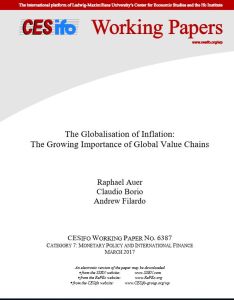Join getAbstract to access the summary!

Join getAbstract to access the summary!
Raphael Auer, Claudio Borio and Andrew Filardo
The Globalisation of Inflation
The Growing Importance of Global Value Chains
CESifo Group Munich, 2017
What's inside?
Globalization is changing the dynamics and transition mechanisms of inflation.
Recommendation
Traditional measures of inflation once largely depended on a nation’s economic conditions and the relative play among its supply, demand and output pressures. However, since the extensive proliferation of global value chains, some experts think that the international economic system can now measurably affect an economy’s domestic inflation. Economists Raphael Auer, Claudio Borio and Andrew Filardo investigate that idea in this in-depth empirical study. Their findings suggest that global production dynamics could have a significant impact on a country’s internal prices. getAbstract recommends this rigorous, scholarly report to economists, analysts and policy experts concerned about the viability of national monetary policy and control.
Summary
About the Authors
Raphael Auer, Claudio Borio and Andrew Filardo are economists at the Bank for International Settlement.


















Comment on this summary